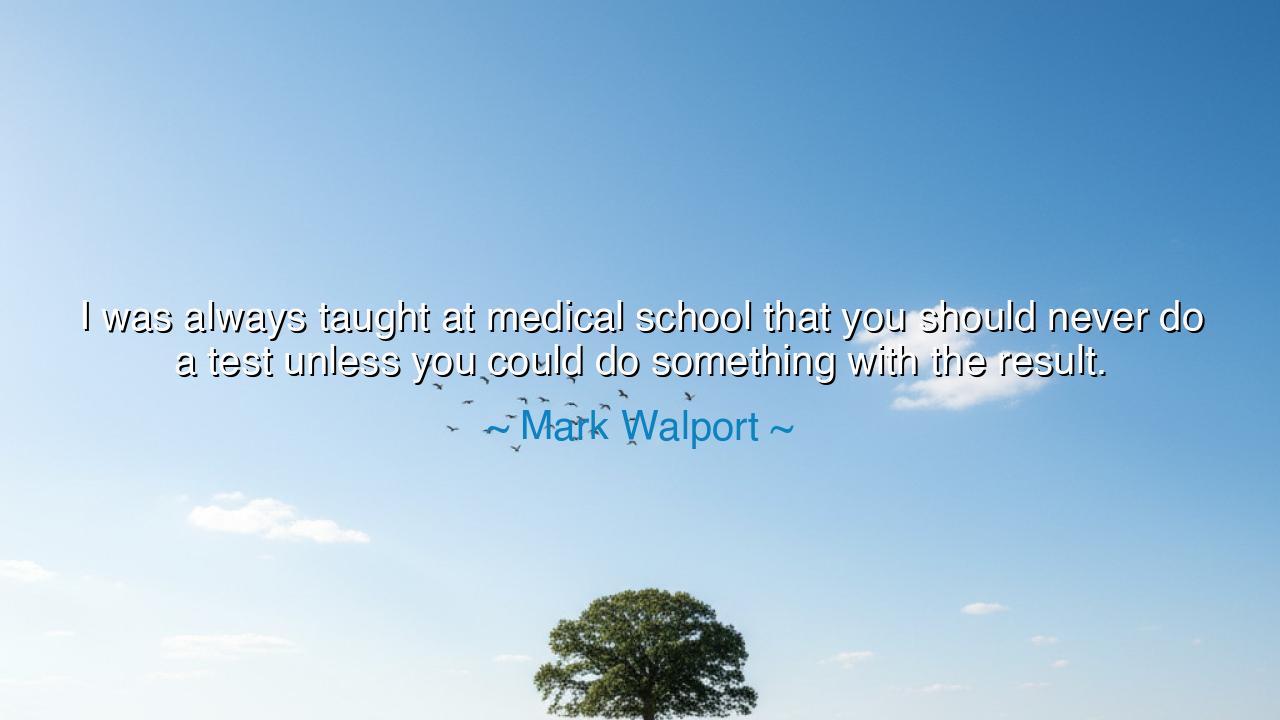
I was always taught at medical school that you should never do a
I was always taught at medical school that you should never do a test unless you could do something with the result.






The words of Mark Walport—“I was always taught at medical school that you should never do a test unless you could do something with the result.”—may appear, at first, as a simple rule of medicine. Yet within them lies a profound philosophy of wisdom, restraint, and purpose. It is not merely a lesson for physicians, but for all who seek understanding in a world drowning in information. His statement reminds us that knowledge without application is vanity, and that inquiry without purpose leads to confusion rather than enlightenment. In an age where the quest for knowledge often becomes a race for its own sake, Walport calls us back to the ancient virtue of meaningful action—the discipline of learning only to heal, to build, to change, to do.
In medicine, this principle is sacred. Every test—whether it be of blood, body, or spirit—carries weight. It stirs expectation, reveals secrets, and alters lives. The physician who orders a test bears a moral duty, for every answer carries consequence. To test without cause is to play with fear; to gather data without intent is to burden the soul with useless anxiety. Thus, Walport’s teaching echoes the wisdom of the ancient healers, who saw medicine not as a mechanical craft, but as a covenant between knowledge and mercy. The doctor’s art, they taught, is not in how much he can measure, but in how well he can judge when to measure at all.
The origin of this wisdom lies in the training of those who walk the path of healing. As a student of medicine, Walport was taught the discipline of restraint—the humility to act only when action serves the patient’s good. This rule, though practical, reflects a much deeper truth: that knowledge must serve compassion. The purpose of medicine is not curiosity, but care. The body, like the world, is a sacred text; one must read it not to boast of understanding, but to restore its harmony. To test for the sake of testing is to mistake motion for progress, just as in life we mistake activity for purpose. The wise physician knows that the value of a question lies not in its cleverness, but in its power to heal.
History offers us many lessons on this truth. In the late 19th century, the brilliant physician Ignaz Semmelweis discovered that the simple act of handwashing could prevent the deaths of mothers in childbirth. He had no vast laboratory, no wealth of tests; only observation, reasoning, and compassion. Others around him, fascinated by the growing world of medical experimentation, dismissed his findings because they sought complexity over clarity. They performed countless procedures and investigations, chasing knowledge that served pride more than life. Semmelweis, guided by the simplicity of doing only what could save, transformed the world. In him, Walport’s principle lives: knowledge must never wander without purpose—it must always bend toward mercy.
There is also a philosophical mirror to this teaching. In every field—science, politics, art, or faith—there are those who gather information endlessly, mistaking data for wisdom. They collect facts, run experiments, issue surveys, and yet fail to ask: What shall we do with what we know? The ancients would call such behavior folly, for they understood that wisdom without direction breeds chaos. The philosopher Socrates himself once said, “To know what is good and not to do it is the same as ignorance.” Walport’s words carry this same spirit: that understanding, without the will to apply it, is a betrayal of knowledge itself.
In a broader sense, his teaching speaks to the balance between curiosity and responsibility. The desire to learn is divine, but it must be tempered by purpose, lest it devour itself. One may ask questions endlessly—about the universe, about others, about oneself—but if those questions do not guide one toward growth, compassion, or truth, then they become noise in the soul. Just as a physician must not test without intent, so too must a seeker of truth not inquire without heart. Every question should be an offering to the good; every discovery, a step toward harmony.
From Mark Walport’s wisdom, we learn that purpose is the soul of knowledge. The lesson extends far beyond the hospital walls: before acting, ask why; before measuring, know what you seek; before speaking, understand what your words will heal or harm. The wise do not fear ignorance as much as they fear aimlessness. For ignorance can be cured by learning, but aimlessness consumes learning itself, leaving it hollow. Let us then approach all knowledge as the healer approaches the test—not with haste, but with reverence, asking always: What good will this serve?
So let his teaching be remembered as a law for all who seek truth in any craft: Do not test merely to know; know in order to act. For wisdom is not found in the abundance of data, but in the rightness of action. The ancients taught that the light of understanding is sacred only when it warms others. So too in life—learn what you must, ask what you should, but always let your knowledge serve life itself. For the truest wisdom is not in discovering how much we can know, but in knowing when, and why, to ask.






AAdministratorAdministrator
Welcome, honored guests. Please leave a comment, we will respond soon